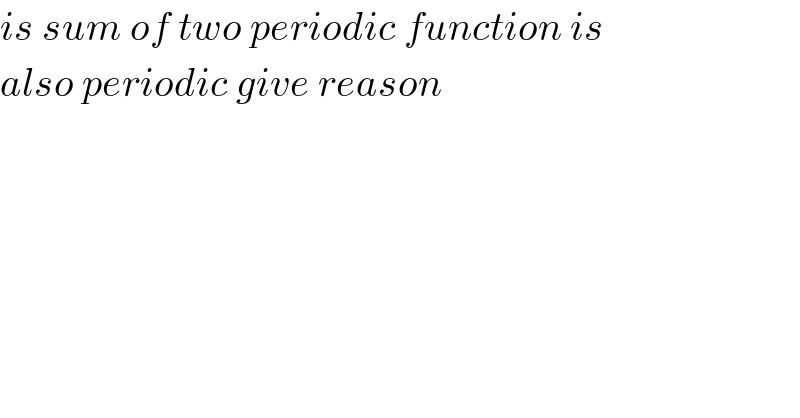
Question Number 25800 by rita1608 last updated on 15/Dec/17

$${is}\:{sum}\:{of}\:{two}\:{periodic}\:{function}\:{is} \\ $$$${also}\:{periodic}\:{give}\:{reason} \\ $$
Answered by kaivan.ahmadi last updated on 15/Dec/17
![yes.if T_f =T_1 and T_g =T_(2 ) then we have T_((f+g)) =T=[T_1 ,T_2 ]. T=mT_1 =kT_2 ; m,k∈Z. f+g(x+T)=f(x+T)+g(x+T)=f+g(x)](Q25802.png)
$$\mathrm{yes}.\mathrm{if}\:\mathrm{T}_{\mathrm{f}} =\mathrm{T}_{\mathrm{1}} \mathrm{and}\:\mathrm{T}_{\mathrm{g}} =\mathrm{T}_{\mathrm{2}\:} \mathrm{then}\:\mathrm{we}\:\mathrm{have} \\ $$$$\mathrm{T}_{\left(\mathrm{f}+\mathrm{g}\right)} =\mathrm{T}=\left[\mathrm{T}_{\mathrm{1}} ,\mathrm{T}_{\mathrm{2}} \right]. \\ $$$$\mathrm{T}=\mathrm{mT}_{\mathrm{1}} =\mathrm{kT}_{\mathrm{2}} ;\:\mathrm{m},\mathrm{k}\in\mathbb{Z}. \\ $$$$\mathrm{f}+\mathrm{g}\left(\mathrm{x}+\mathrm{T}\right)=\mathrm{f}\left(\mathrm{x}+\mathrm{T}\right)+\mathrm{g}\left(\mathrm{x}+\mathrm{T}\right)=\mathrm{f}+\mathrm{g}\left(\mathrm{x}\right) \\ $$
Commented by rita1608 last updated on 15/Dec/17
![but the sum of two periodic functions like x−[x]and ∣sinx∣ is not periodic then how it is possible that sum of two periodicfunctions will be periodic](Q25803.png)
$${but}\:{the}\:{sum}\:{of}\:{two}\:{periodic}\:{functions}\: \\ $$$${like}\:{x}−\left[{x}\right]{and}\:\mid{sinx}\mid\:{is}\:{not}\:{periodic} \\ $$$${then}\:{how}\:{it}\:{is}\:{possible}\:{that}\:{sum}\:{of}\: \\ $$$${two}\:{periodicfunctions}\:{will}\:{be}\:{periodic} \\ $$
Commented by kaivan.ahmadi last updated on 15/Dec/17
![(T_1 /T_2 )must be rational otherwise we cant calculate [T_1 ,T_2 ]](Q25804.png)
$$\frac{\mathrm{T}_{\mathrm{1}} }{\mathrm{T}_{\mathrm{2}} }\mathrm{must}\:\mathrm{be}\:\mathrm{rational}\:\mathrm{otherwise}\:\mathrm{we}\:\mathrm{cant} \\ $$$$\mathrm{calculate}\:\left[\mathrm{T}_{\mathrm{1}} ,\mathrm{T}_{\mathrm{2}} \right] \\ $$
Commented by kaivan.ahmadi last updated on 15/Dec/17

$$\frac{\mathrm{1}}{\pi}\notin\mathrm{Q} \\ $$
Answered by sushmitak last updated on 15/Dec/17

$$\mathrm{Not}\:\mathrm{always} \\ $$$$\mathrm{cos}\:\left({x}\right)\:\mathrm{is}\:\mathrm{periodic}\:\mathrm{with}\:\mathrm{period}\:\mathrm{2}\pi \\ $$$$\mathrm{cos}\:\left(\pi{x}\right)\:\mathrm{is}\:\mathrm{periodic}\:\mathrm{with}\:\mathrm{period}\:\mathrm{2}. \\ $$$$\mathrm{cos}\left({x}\right)\:+\mathrm{cos}\left(\pi{x}\right)\:\mathrm{is}\:\mathrm{not}\:\mathrm{periodic} \\ $$
Commented by kaivan.ahmadi last updated on 15/Dec/17

$$\mathrm{since}\:\frac{\mathrm{2}}{\mathrm{2}\pi}=\frac{\mathrm{1}}{\pi}\notin\mathrm{Q} \\ $$$$\mathrm{this}\:\mathrm{proposition}\:\mathrm{is}\:\mathrm{true}\:\mathrm{when}\:\frac{\mathrm{T}_{\mathrm{1}} }{\mathrm{T}_{\mathrm{2}} }\:\mathrm{is}\:\mathrm{rational}. \\ $$
Commented by rita1608 last updated on 15/Dec/17

$${thanks} \\ $$
Commented by rita1608 last updated on 15/Dec/17

$${thanks} \\ $$
